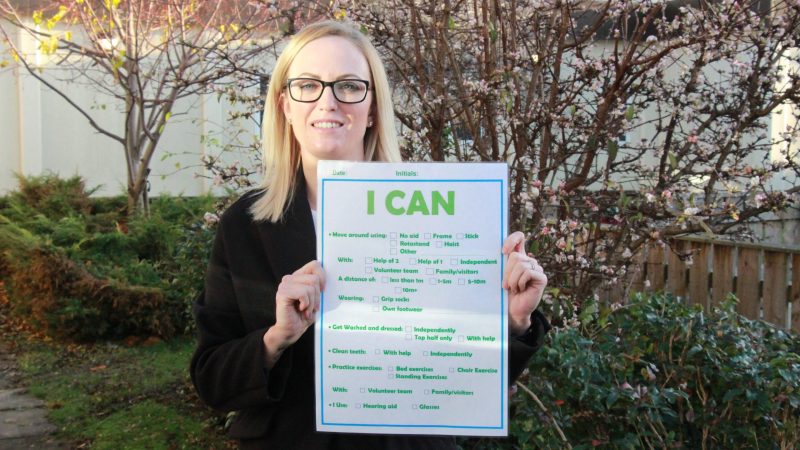
Our ‘I can’ boards above beds give our patients more opportunity to be active – offering huge benefits to their health.
A little movement can have a big impact. That’s why we have introduced new ‘at a glance’ boards above patient beds so ward staff can quickly see what levels of activity each patient can safely manage.
The ‘I can’ boards will be positioned above the beds in Ward 42 and ACU (Acute Cardiology Unit). They include a simple tick-list of everyday activities that the patient can carry out, including:
- Dressing
- Bathing themselves
- Going for a short walk
Active Hospitals
The boards are part of the Trust’s status as one of just four Active Hospitals in the UK. Active Hospitals is an initiative from The Office for Health Improvement and Disparities, funded by Sport England and the National Lottery. It supports increasing the levels of physical activity of patients.
Leanne Mitchell, Active Hospital clinical delivery manager, said: “We’re encouraging patients to be as active as they can be, safely, to support their recovery and to minimise the effects of deconditioning.
“The ‘I can’ boards are a really simple way that the patient and their carers can agree on levels of activity they can carry out to aid their recovery. It’s not about exhausting routines. It’s simple things like taking a stroll or doing simple bed or chair-based exercise in order to retain, where possible, their independence.
“We’re also encouraging patients to bring normal, day clothes with them to hospital, not just bed clothes. Wearing daytime clothes helps people get into a better mind set to be more active than when wearing nightwear. It is often jokingly referred to as ‘pyjama paralysis’ but it’s a real thing. There’s something about spending all day in bed clothes that makes people less willing to go for a walk or do their physiotherapy exercises.
“All the evidence suggests that regular physical movement, even for people in hospital or with long-term health conditions, can have enormous health benefits.”
Physical activity for those with long-term health conditions
The installation of the ‘I can’ boards follows a recent announcement of a new consensus statement, led by the Faculty of Sport and Exercise Medicine UK.
It was developed through review of the scientific evidence and expert clinical and patient consensus. The team has concluded the benefits of physical activity far outweigh the risks for people living with long-term health conditions.
The five ’impact statements’ that make up the consensus agreement conclude:
- for people living with long-term conditions, the benefits of physical activity far outweigh the risks and physical activity is safe
- despite the risks of serious events being very low, perceived risk is high
- it is not as easy as just telling someone to move more; person-centred conversations are essential for addressing perceived risk
- everybody has their own starting point
- people should stop and seek medical attention if they experience a dramatic increase in symptoms
Dr Jeanelle de Gruchy, England’s Deputy Chief Medical Officer, said:
“There has previously been some concern that long-term conditions could be made worse by physical activity.
“However, the evidence is that physical activity has an important role to play in preventing and treating many conditions and that, for most people with long-term conditions, the benefits outweigh the risks.
“This expert consensus, supported by the Office for Health Improvement and Disparities, will help healthcare professionals to have informed, personal conversations with their patients living with long-term conditions.”
